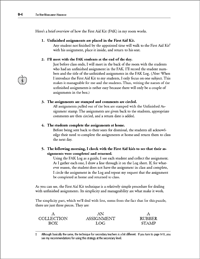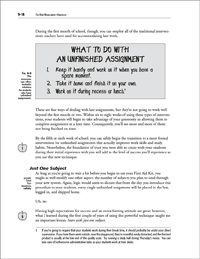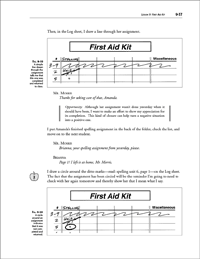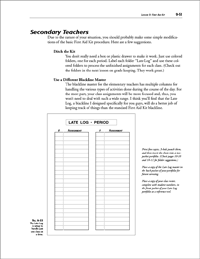

![]()
Goals for this lesson:
-
Learn how to create a powerful tool for handling unfinished assignments.
-
Assemble the three components that comprise this tool.
-
Learn how to recognize and avoid "bad choices."
-
Understand the importance of maintaining a consistent program.
-
Create an easy-to-maintain system for documenting underachieving students.
Sample Pages
Just click on a page image to see the page in PDF format.
Note: Lesson 9 is the longest lesson in the book because being able to deal effectively with late or missing assignments is critical to your success. Thus, there are four pages for you to look over.




![]()
FAQ Lesson 9
Calvin has a spelling assignment in the First Aid Kit because it wasn't finished on time. Later on in the morning, he found himself with some extra time to finish assignments. Would it be okay for him to retrieve his spelling paper from the First Aid Kit to work on it?
The reflexive answer is: "Sure, why not?" Unfortunately, though, we haven't had our FAK meeting yet, which means that his assignment won't be listed on the log sheet in the First Aid folder.
As it stands right now, I've got the finished spelling assignments sitting in my spelling grade book and the unfinished ones sitting in the First Aid Kit. I've got them all. If Calvin, with whatever good intentions he's displaying, gets his spelling paper out of the FAK, it's no longer under my control. The big question then becomes: How do you track this assignment?
You could, of course, have him bring you his assignment and the First Aid Kit Log so that the assignment could be stamped and recorded. That might work. Granted, it wasn't the end of the day when you normally meet; nonetheless, you still had the opportunity to stamp and log the assignment. You could have also added your insights and motivational spin to the situation. Having taken care of FAK business, he'd be able to work on the assignment, and you'd still be able to follow up on it later.
One other concern I have regarding this adaptation of the basic FAK procedure--and I'm all for adapting any process in order to maintain its efficacy--would be the effect it might have on Calvin's dedication to bearing down on his spelling assignments during your scheduled time for spelling. If he knows, in the back of his mind, that he might be able to finish it later during social studies time because he plans to finish his social studies assignment early, there's a good chance that he may be less inclined to complete the spelling assignment sitting in front of him at the moment. "Ah," he thinks, "I'll finish this later during social studies." This is not the way you want your students to plan their day.
My feeling is this: once it goes in, it stays in.
I'm standing at the door of our room collecting assignments in numerical order. As soon as I've collected them all, we're going outside for P.E. Should I have the students who weren't finished work on their assignments while the rest of us play?
As much as you might feel this intervention is justified, I don't think it's a good idea. For the most part, your daily activities--especially the fun ones--shouldn't be used as weapons in the war against poor work skills. Consequences need to fit the situation, and I'm not sure how vocabulary is connected to P.E.
For a better explanation of how behavior and consequences are connected, read Robert MacKenzie's seminal work, Setting Limits in the Classroom. He has an entire chapter devoted to appropriate interventions. Do yourself a favor. Read this book. Enough said.
One of the great things about the elementary environment is that you are with one group of students all day long. Consequently, you have the advantage of being with your students through good times and bad. By playing with the underachievers during P.E., I'm able to build a bond which I can then use to motivate them during spelling. If, on the other hand, they're denied entry to the fun stuff due to their inability to complete activities they think are not fun, they might end up seeing the day as a never-ending string of unpleasant experiences. This may be overstating it a bit; but, that's how kids think.
Nonetheless, for those situations in which you have a student who has developed a pattern of not having certain assignments done on time, it would be appropriate to invoke consequences. One of the first steps I take with the hard-core non-finishers would be a loss of freedom. (You may recall that, in our room, freedom is just the opportunity to make choices.)
Mr. Morris
Speaking to Calvin who, once again, does not have his spelling finished:
Calvin, if you continue to make bad choices, I'll have to make the choices for you. My choice, next time you're not done with spelling, is that you'll work on it during P.E. I'm going to let you play today. I know how much you enjoy playing kickball. I like it when you're out there playing with us. Unfortunately, though, you're going to have to spend P.E. time finishing spelling if you can't get it done on time. Do yourself a favor and have it done tomorrow.If you're going to restrict students from what is normally a regular part of your day, make an effort to warn them before you act. That way, no one can complain that you were not being fair.
What do you do with the student who doesn't bring back a First Aid Kit assignment?
The basic procedure is:
1. Circle the assignment in the log sheet.
2. Have the student state his agreement to complete the assignment and return it to class the next day.
After one week, the student receives an "incomplete" for that assignment. You should make a point of apprising the student--and if possible, the parents--of this action. A simple way to keep the parents aware of these situations would be to prepare a standardized note with blanks to fill in for the student's name, the date, the incomplete assignment, etc. By having a ready-made communication tool, kind of like a form letter, you'll find yourself using it more than if you had to hand write a letter to the folks each time there was an incomplete assignment.
Although you may feel frustrated with the student who seems to be doing nothing, you're actually preparing the way for a more formal intervention. By using the First Aid Kit Log to keep track of his lack of effort and your attempts at remediation, you'll eventually find yourself with the documentation you need for a parent conference or a consultation meeting with the school counselor. Without the daily documentation, you'll just end up feeling frustrated.
What do I do with an assignment that was turned in on time but shows poor quality or lack of effort?
Pop that bad boy back in the First Aid Kit. Although the FAK is normally reserved for assignments that are not finished on time, there's nothing wrong with using it to boost quality.
Let's not forget, though, that the first step in the accountability process is getting kids to accept the fact that they are responsible for completing assignments on time. Once that's been established--and for some students, this step takes a long time--you can then focus on doing a quality job.
Reality: Poor quality, not much effort, or handwriting that looks like Sanskrit? First Aid Kit, please.
May I leave assignments in there for a couple of days and then pass them back for students to finish during Friday Free Time?
Feel free to use your First Aid Kit any way you wish. After all, that's what's going to make it work for you and your students. (By the way, what's Friday Free Time? Sounds like fun.)
